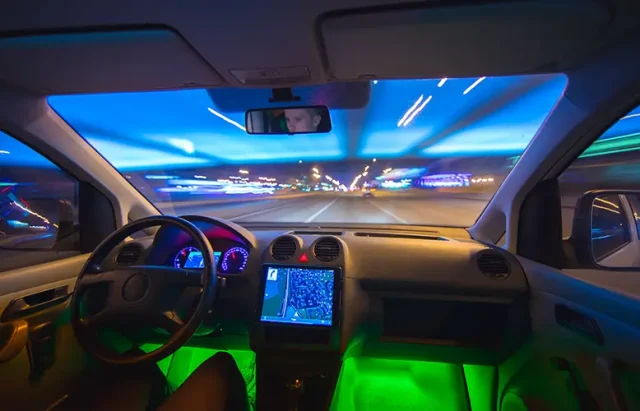
Technology is advancing at a rapid rate. If you remember the Jetsons cartoon, it can seem like we’re getting closer to this lifestyle every day. One advancement grabbing headlines is the introduction of self-driving cars. While it can have benefits, there can also be some downsides.
One potential downside that can happen is what happens if you’re involved in an accident with a self-driving car—one of the interesting drawbacks of innovation in the modern age.
Navigating legal issues after a self-driving car accident can be challenging. After all, who’s liable if there isn’t a driver? We’re looking at some of the factors that determine if you have an accident claim, along with who may be the liable party.
Florida Insurance Laws for Self-Driving Vehicles
Whether the vehicle comes with an auto-pilot function or is a fully automated car, it must carry at least the state’s minimum insurance requirements.
Florida’s minimum insurance requirements are the same for all motor vehicles. The only exception may be motorcycles. The Sunshine State typically doesn’t require auto insurance for motorcycles but it’s still a good idea to check with your local ordinances.
What are the minimum insurance requirements in Florida? Everyone with a vehicle registered in the state must carry at least:
- $10,000 in personal injury protection (PIP)
- $10,000 in property damage liability (PDL)
Failing to meet the state’s minimum requirements can result in fines and possible license suspension.
Steps for Filing an Accident Claim Against a Self-Driving Vehicle
Filing an accident claim against a self-driving vehicle is basically the same as when a human is behind the wheel. Since Florida follows no-fault insurance rules, you file a claim with your insurance provider.
Your PIP insurance typically covers your medical expenses and any lost income. If your injuries are preventing you from returning to work you can usually recover some or most of your lost current income. Your PIP coverage pays out up to the policy’s cap or 80% of your medical costs, whichever threshold is reached first.
If you’re only carrying liability insurance, you can’t file a property damage claim with your provider. Liability insurance only covers damage to the other driver’s vehicle if you’re the at-fault driver. If you have full coverage, you should be able to claim your property damage. The amount of compensation you can recover depends on the terms of your policy.
So, what about damages not covered by your insurance provider? Are you stuck paying these costs out of your pocket? The answer depends on a few factors.
Determining Liability
You must prove liability to file a claim for any damages not covered by your insurance provider. You should also know Florida follows modified comparative negligence rules. This insurance rule allows for more than one driver (vehicle) to be responsible for causing the same accident.
Each liable party is assigned a percentage of fault. If your percentage of fault is 50% or lower, you can still file an injury claim. However, your damages are reduced by your assigned percentage of blame. If you’re wondering if you can share fault with a self-driving car, the answer is yes.
For example, the self-driving car doesn’t stop at a red light but you’re speeding when the accident occurs. In this scenario, both vehicles share blame for the accident.
Gathering evidence at the accident scene like documenting your vehicle’s position can help establish negligence in an auto accident claim. Working with an experienced accident attorney can also help you avoid being unfairly assigned blame.
After figuring out which vehicle is liable for the accident, you still need to know who to name in your injury claim. After all, you can’t simply list the make and model of the vehicle. If you do, your claim isn’t going to go very far. So, who can be liable in a self-driving vehicle accident?
- The manufacturer if there’s a design flaw leading to the accident. The manufacturer can also be liable if there are issues with the vehicle’s manufacturing process or if the automated process doesn’t receive accurate instructions. An example of this can be if the manufacturer neglects to instruct the vehicle to stop at all red lights.
- Human drivers can also be liable if they’re not paying attention to the vehicle’s performance. Just because the vehicle is on auto doesn’t mean the human driver isn’t responsible for the car’s performance.
The vehicle owner can also be liable for your damages if they fail to keep up with the car’s maintenance. Sometimes determining who to name in an accident claim can be a complex process requiring legal expertise.
Notify the Liable Party’s Insurance Provider
To satisfy the statute of limitations, this is the time you have to file an accident claim, go ahead and notify the liable party’s insurance provider.
All you’re doing is letting the insurance provider know you’re planning on filing a personal injury claim. Don’t go into detail about the accident or your damages. You’re not ready to tackle this step.
Calculate Your Damages and Organize Evidence
Your damages are only those not covered by your PIP insurance. If you also have full coverage, you can’t claim any loss already taken care of.
Your damages probably include your remaining medical and property damage expenses. You can also include any non-economic damages like pain and suffering. Non-economic losses aren’t covered by PIP.
Calculate the value of these damages and gather your supporting evidence. This usually includes copies of your medical records, bills, and receipts. Don’t forget to include a copy of your accident report. This is always a requirement.
Without an accident report, the insurance company can claim the accident didn’t happen. After you finally get everything together, you can go ahead and submit your self-driving car accident claim to the insurance company.
You Can Recover Compensation for a Self-Driving Car Accident
Recovering compensation in a self-driving car accident is possible—however, you can run into complications like determining who is the negligent party involved. Since the car is self-driving, you may not be able to name a human driver outright as a defendant in the case.
To help simplify the legal process and make sure that you can recover compensation, it’s usually best to work with an experienced personal injury attorney. They have the knowledge and expertise you need to help ease the pain and suffering you may have experienced.





